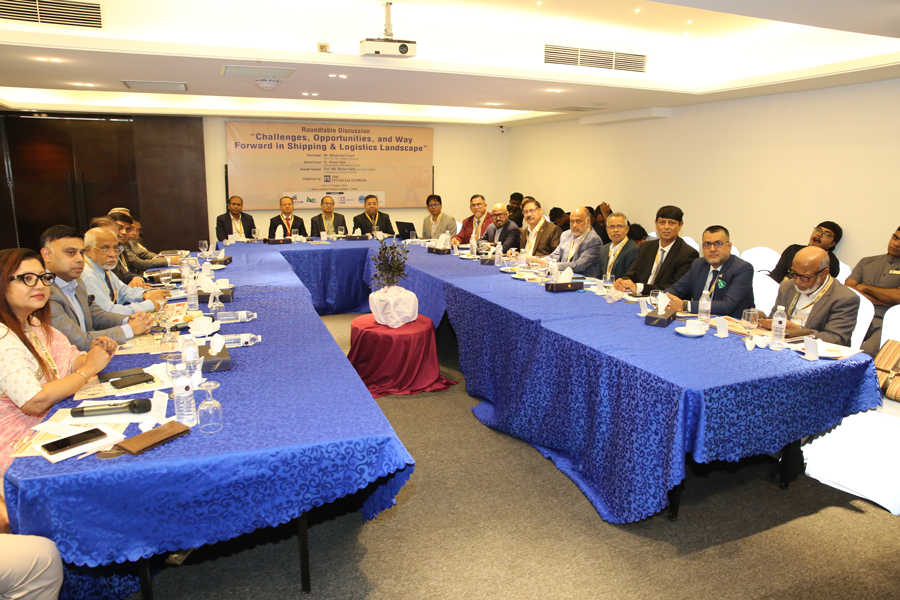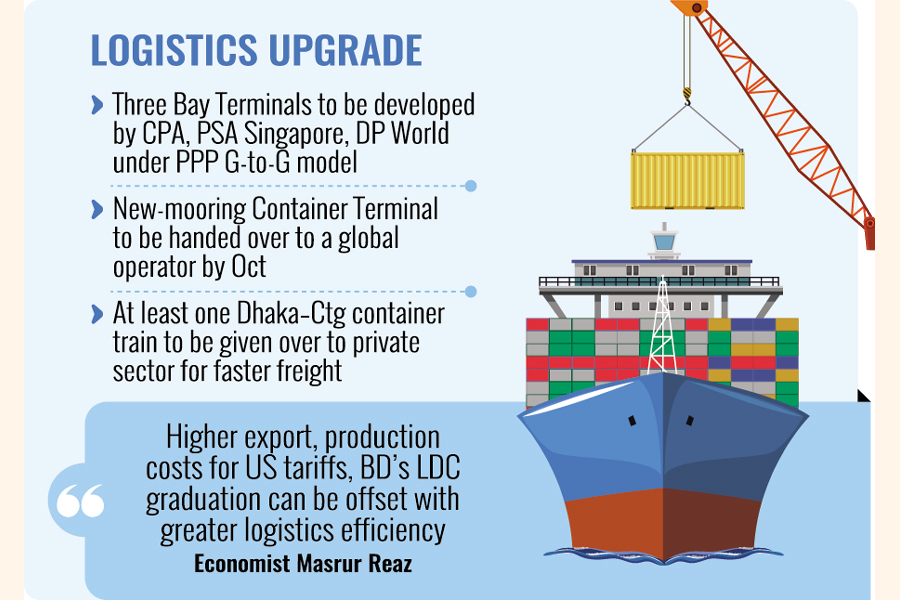
Published :
Updated :

A multimodal logistics hub integrating railway, road, and Chittagong seaport facilities will be developed near the Bay Terminal to boost Bangladesh's trade-facilitating efficiency, as efforts are geared towards US$100-billion annual export earnings.
To this end, the World Bank-financed Bay Terminal Breakwater Project is moving ahead, with a subsidiary loan agreement to be signed today, following an earlier deal made between ERD and the Bank in Washington, said Senior Secretary, Shipping, Mohammed Yousuf at a roundtable organised by The Financial Express on Sunday in Dhaka.
Bangladesh Garment Manufacturers and Exporters Association (BGMEA), Bangladesh Knitwear Manufacturers and Exporters Association (BKMEA), Conveyor Group, Bangladesh Shipping Agents Association (BSAA), Bangladesh Container Shipping Association (BCSA), and Anchorage Container Depot Limited sponsored the roundtable titled "Challenges, Opportunities, and Way Forward in Logistics Landscape”.
The chief guest said three Bay Terminals will be developed by CPA, PSA Singapore, and DP World and tender evaluation is expected within a month or two. By 2036, the Bay Terminal is projected to handle 5.36 million TEUs, compared to Chittagong Port's current 2.86-million-TEU capacity, which is already overstretched handling 3.3 million TEUs annually.
The project is being implemented under a PPP G-to-G model, requiring a transaction adviser. Foreign firm Ernst & Young has exited, and the ministry is in talks with the ADB to cut costs.
A TA report is expected by October, with at least one Bay Terminal likely to be handed over to a contractor by December, Yousuf said.
He also expressed the hope that the New-mooring Container Terminal (NCT) would be handed over to a global operator by October under a transparent agreement.
On the National Logistics Policy, Yousuf said it would be amended soon and that two high-powered committees -- led by the Chief Adviser and the Principal Secretary -- were already formed.
An action plan under the policy is expected within a month, incorporating inputs from the FE roundtable, the World Bank, and relevant ministries.
Mr Yousuf also announced plans for setting up a Port Community System integrating Chittagong, Mongla and Payra seaports, based on a World Bank design.
He urges businesses to move empty containers to off-docks or return them to ships to ease congestion at the Chittagong seaport.
The railway authority has agreed to hand over at least one Dhaka-Chittagong container train to the private sector. A Matarbari Phase-II master plan is also underway, including an LNG and LPG terminal and a new CPA dockyard.
The Finance Ministry-approved port tariffs will only be finalised after consultation with stakeholders. The CPA has emphasized raising revenue for infrastructure but assured that tariff hikes will not be forthcoming.
Some NCT equipment, installed in 2007, now requires replacement, while the NBR, the CPA, and the Shipping Ministry are coordinating on wider port reforms.
The official also conveyed the Chief Adviser's instructions for waiving the 7.5-percent VAT on ship imports to encourage investment, though the matter remains subject to IMF concurrence.
Despite progress in physical infrastructure, Yousuf notes, Bangladesh continues to lag behind India and Vietnam in attracting foreign direct investment (FDI), receiving just US$3 billion in 2023, mostly from existing investors.
"Without reducing logistics costs, we will not be able to enhance export- competitiveness," he alerts.
Director-General at the Chief Adviser's Office Dr Ahmed Ullah told the meet that the chief adviser's office has decided to revisit the logistics policy. There are many issues yet unaddressed could be added to the policy.
"Reform is going on -- the government is trying its best, but it is slow," the DG said.
Editor of The Financial Express Shamsul Huq Zahid presided over the discussion while Independent University, Bangladesh Professor Dr Md Mamun Habib presented the keynote paper and The Financial Express Online & Digital Content Head Shiabur Rahman Shihab moderated it.
Bangladesh Oceangoing Ship Owners Association (BOGSOA) President Azam J Chowdhury, Bangladesh Freight and Forwarders Association (BAFFA) former President Kabir Ahmed, BKMEA President Mohammad Hatem, Bangladesh Shipping Agents' Association (BSAA) Chairman Syed Mohammad Arif, BGMEA Senior Vice-President Inamul Haq Khan and Advisor AM Mahbub Chowdhury, Bangladesh Container Shipping Association (BCSA) General Secretary Shamsuddin Chowdhury and Member Harun or Rashid, AmCham President Syed Ershad Ahmed, Policy Exchange Bangladesh Chairman Masrur Reaz, World Bank Senior Transport Specialist Nusrat Nahid Babi, BARVIDA President Abdul Haque, Bangladesh Bank Director Mohammad Sazzad Hossain, Bangladesh Garments Accessories & Packaging Manufacturers & Exporters Association (BGAPMEA) President Md Shahriar, Birds Bangladesh Agencies Ltd Director M. Robiul Islam Sagar, and Bangladesh Charcoal Manufacturers and Exporters Association (BCCMEA) President Atikur Rahman also spoke at the event.
Terming the sector not-enough-recognised, The Financial Express Shamsul Huq Zahid said the financial daily would organise another seminar on a larger scale to give the trade-facilitating backbones a much-needed shot in the arm.
"With increased efficiency in the logistics sector, there is possibility of increase in export and decrease in the cost for end-consumer," he said.
He also said The Financial Express would prepare a set of recommendations for the policymakers on the basis of the inputs that came out from the roundtable.
BOGSOA President Azam J Chowdhury appeared critical of the government for not engaging the private sector in the decision-making process.
He said, "Developed logistics sector would be able bring increasing amounts of foreign currencies."
 Addressing the event, BKMEA President Mohammad Hatem said foreign operators could help raise management efficiency and allow local manpower to acquire modern technology and international-standard practices.
Addressing the event, BKMEA President Mohammad Hatem said foreign operators could help raise management efficiency and allow local manpower to acquire modern technology and international-standard practices.
"A port is a service-oriented organisation. Such a steep rise in charges without any discussion or logical explanation is unjustified," he said, referring to a sudden 40-percent hike in charges at Chattogram Port.
Hatem shot a question as to why a government institution should aim to make excessive profits.
He stressed the need for operationalising the Bay Terminal quickly, while fully utilising the capacities of Mongla and Payra ports to help achieve the $100-billion export target.
Also, he said, addressing the gas and electricity crises, ensuring uninterrupted energy supply, and improving the law-and-order situation are vital for boosting exports.
Other business leaders echoed similar concerns about inefficiencies at Chattogram Port -- Bangladesh's commercial lifeline, up till now -- and the need for international standards.
AmCham President Syed Ershad Ahmed notes that logistics industry in Bangladesh is still shaping. "The country's infrastructures do not involve logisticians in the building process, which in turn, doesn't help the infrastructure to utilize."
BGMEA Senior Vice President Inamul Haq Khan notes that container handling at the port takes 5 to 6 days, compared to the global standard of 1 to 2 days. "Often, we are forced to send goods by air to meet buyers' commitments, which costs four times more than seaway shipments."
Former BAFFA President Kabir Ahmed also urged the government to allow foreign operators, saying a "vested group" continues to oppose such moves. He stressed the need for reforms at Biman and Hazrat Shahjalal International Airport, where all four EDS (Explosives Detection Systems) machines remain inactive.
He identified the National Board of Revenue (NBR) as the biggest challenge for logistics, urging policy measures to improve port efficiency and punish those causing delays.
BGAPMEA President MD Shahriar said every truck in metropolitan areas is forced to pay Tk 50-200 in bribes, while port delays force trucks to stay an extra 3 to 4 days, raising exporters' costs.
He also alleged that the behaviour of Chattogram Port Authority officials "suggests they think they are running Singapore Port, while the reality is far worse".
BARVIDA President Abdul Haque points out that Bangladesh's infrastructure costs are higher than global standards, while countries like Vietnam have lowered costs through reforms. He laments "multiple transport ministries exist, but none effectively manages multimodal transformation".
BSAA Chairman Syed Mohammad Arif criticised the recent port-charge hike imposed without stakeholder consultation, which has triggered a chain reaction of rate hikes across services.
BCSA General Secretary Shamsuddin Chowdhury told the meet that berth-operator appointments should be decided by container agents. He warns that Chattogram Port has already reached its maximum capacity and that alternative solutions are necessary to achieve the $100-billion export target by 2030.
The government has, meanwhile, said it is moving forward with infrastructure expansion.
Policy Exchange Bangladesh Chairman Masrur Reaz finds the country "five decades behind" in developing logistics as a sector, as it was never recognised with proper policy, regulatory framework, or market development until the recent logistics policy framework was initiated.
He notes that higher export and production costs stemming from US tariffs and LDC graduation could be offset by greater logistics efficiency. "Bangladesh could also benefit from shifts in global value chains and higher US tariffs on other countries, but only if its logistics system is upgraded."
Reaz criticised delays in enacting the National Logistics Policy, saying that Bangladesh is already a decade behind since its formulation.
Stressing the need for reform, he argues that Chittagong Port must be freed from exclusive government operation and opened to private operators to realise its full potential. "There is no alternative to engaging a global operator at Chittagong port to raise efficiency," he told the seminar.
Delivering the keynote paper Prof Md Mamun Habib pointed out that Bangladesh continues to lag behind its South Asian peers in global logistics rankings. In the World Bank's Logistics Performance Index (LPI), the country ranked 88th in 2023, compared to India at 38 and Sri Lanka at 73.
"We are consistently weakest in infrastructure and business fundamentals, which makes it difficult to compete globally," the academic observed.
Key challenges, he said, include poor integration of transport networks, inadequate warehousing and distribution facilities, and delays in implementing the long-awaited national logistics strategy.
Despite the constraints, Prof Habib sees opportunities, including the recently-approved but yet-to-be-implemented national logistics strategy, growing private-sector interest in ICD investment, and the scope for automation, artificial intelligence, blockchain, and other digital technologies in supply chain management.
"Bangladesh must embrace automation, ethical practices, and human-resource development to build a smart, resilient, and environmentally sustainable logistics ecosystem," he stressed, calling for greater coordination among port authorities, customs, civil aviation, and regulatory agencies.
World Bank’s Nusrat Nahid Babi said Bangladesh spends as much as 16 percent of its gross domestic product (GDP) on moving goods from factories to customers, far above the global average of 10 percent.
She said between 35 and 54 percent of these logistics costs are linked to inefficient transport systems.
“This burden [high logistics cost] is eroding the country's trade competitiveness and discouraging investment,” Nusrat Nahid said.
Referring to more than 62 regulatory bottlenecks, she said many of these could be resolved through better coordination rather than large-scale investment.
To cut expenses and improve performance, she urged timely project implementation, multimodal connectivity, digitalisation and logistics related skills development.
doulotakter11@gmail, newsmanjasi@gmail.com, bdsmile@gmail.com


 For all latest news, follow The Financial Express Google News channel.
For all latest news, follow The Financial Express Google News channel.